Exotic Guinea Fowl
Available Birds - PRICE LIST
Birds are priced per pair unless otherwise stated
Prices subject to change without prior noticed.
Vulturine guinea fowl _____$900pair
Crested guinea fowl ____$915pair
Fertile eggs ________$20 each
__________________________________________________________
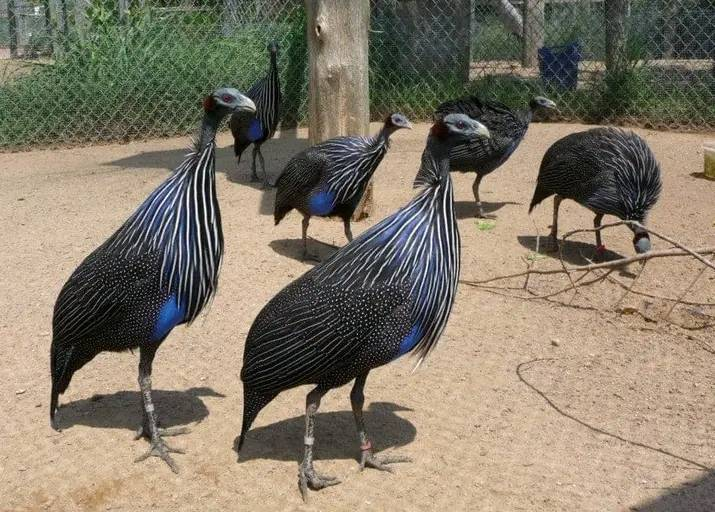 I maintain a flock of guineafowl for several reasons. They produce great eggs and alert me when I have visitors as quickly as any watchdog, but most importantly, they spend the day foraging for ticks. Here in the tropics, I have a lot of ticks, and if you live in an area with Lyme disease, Rocky Mountain Spotted Fever, or other tick diseases,guinea might be the best animal you have ever owned.
I maintain a flock of guineafowl for several reasons. They produce great eggs and alert me when I have visitors as quickly as any watchdog, but most importantly, they spend the day foraging for ticks. Here in the tropics, I have a lot of ticks, and if you live in an area with Lyme disease, Rocky Mountain Spotted Fever, or other tick diseases,guinea might be the best animal you have ever owned.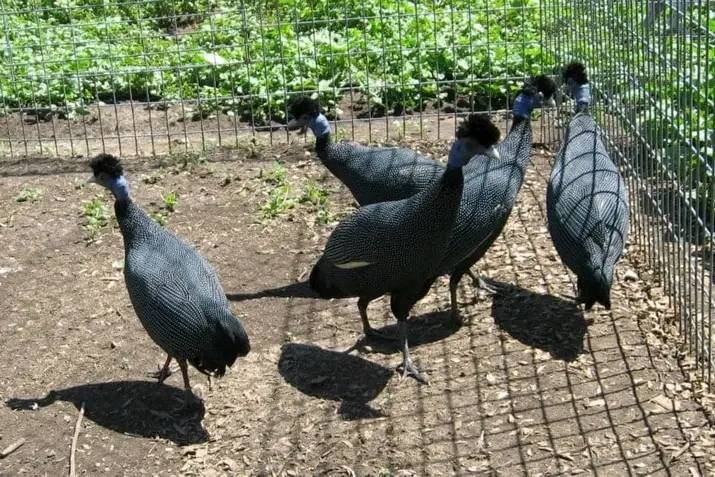 Guinea fowls are well adapted to heat and sunlight, and they can do very well even without a lot of extra care. You will need to search for the best feed sources for your new guineas, adapt heating sources since the requirements are so different, and maybe even look into alternative incubation sources, but it is all worth it.
Guinea fowls are well adapted to heat and sunlight, and they can do very well even without a lot of extra care. You will need to search for the best feed sources for your new guineas, adapt heating sources since the requirements are so different, and maybe even look into alternative incubation sources, but it is all worth it.
The birds are friendly and make excellent watchdogs. If kept alone, they like to sit with their human keeper, but in flocks, they will usually prefer their own types, like many animals. The birds spend their days eating ticks and other insects around the property, and during their foraging, they will eat enough to produce eggs and pay for any upkeep.
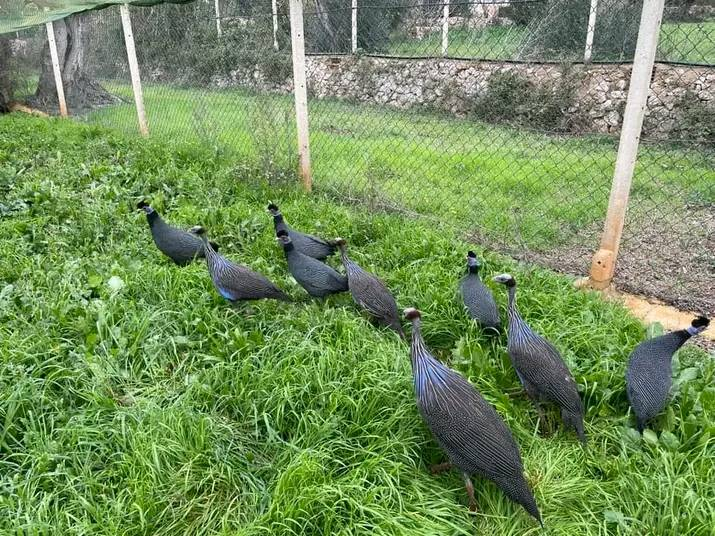 Housing Your New Keets
Housing Your New Keets
Raising keets (hatchling guineas) is not as easy as raising chicks. Like with any new animal, it is important to prepare the housing before arrival. Get several birds (at least 6 but 10 is even better), and make sure they have room to grow for the next few weeks. In the tropics, you will not need to buy a heat lamp for them, but if they are to be raised without their mother, they might get chilled at night and need some source of supplemental heat.
A simple incandescent light bulb will provide enough warmth in the evenings. If you do not have reliable electricity or do not want to put a lamp in the outdoor cage, the alternative is to bring your keets in at night and keep them in a small cage.
I cannot guarantee the birds will not be chilled since some tropical regions can get cold at night. If you have a broody hen, you can put the keets with her, but she might end up stepping on and harming the keets.
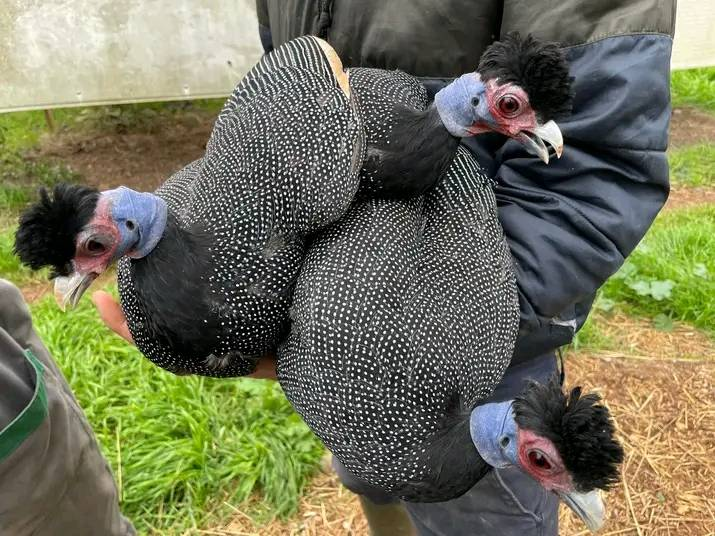 Bedding for Your New Keets
Bedding for Your New Keets
Wire cage bottoms are easy to clean and will keep predators away from your keets, but they will cause you a lot of problems and may end up killing your new keets when they get their feet trapped. Your new guineafowl should also not be kept on sawdust because the keets will peck constantly and sometimes mistake the wood chips for food. Their small stomachs will soon fill up with wood, and they will die of hunger.
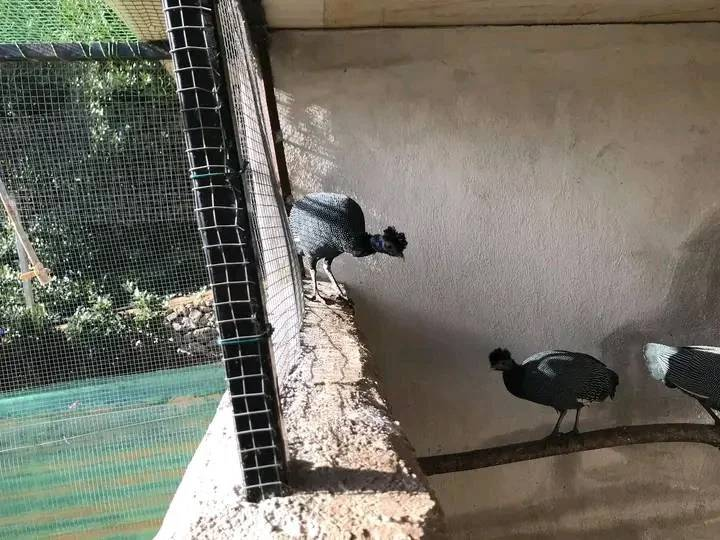 Do not use newspaper, though, as it is too slick. Some guinea farmers recommend paper towels, and they are fine if available where you live.
Do not use newspaper, though, as it is too slick. Some guinea farmers recommend paper towels, and they are fine if available where you live.
The best bedding I have found is cardboard. Normal cardboard is too slick, and the keets can slip and dislocate their legs; rip the cardboard in half so that the corrugated portion is visible. Put the slick side down and leave the corrugated portion on top.
In a few weeks, when the keets are larger, you can let them run on dirt. If you have a wire bottom cage, set it directly on the ground.
 Feeding and Watering Keets
Feeding and Watering Keets
If you have turkey starter ration available where you are living, purchase that product and start your keets outright. Keets should not be fed chicken grower ration, but sometimes that is the only thing available. Chicken starter ration is only about 22% protein, most of that coming from soy protein. If that is the only feed available, you should supplement feed with a higher protein ration. I purchase a fish ration, which is 40% protein, most of that from fish viscera.
It may not sound tasty, but the keets like to find the little fish granules in their starter ration and will eat them with gusto. I usually add a few handfuls of fish granules for every 125 grams of chicken starter ration that I give at each feeding. (The chicken and turkey starter rations will already contain a coccidiostat. This medicine will help prevent coccidiosis and loose stools that will cause your keets to become dehydrated and die.)
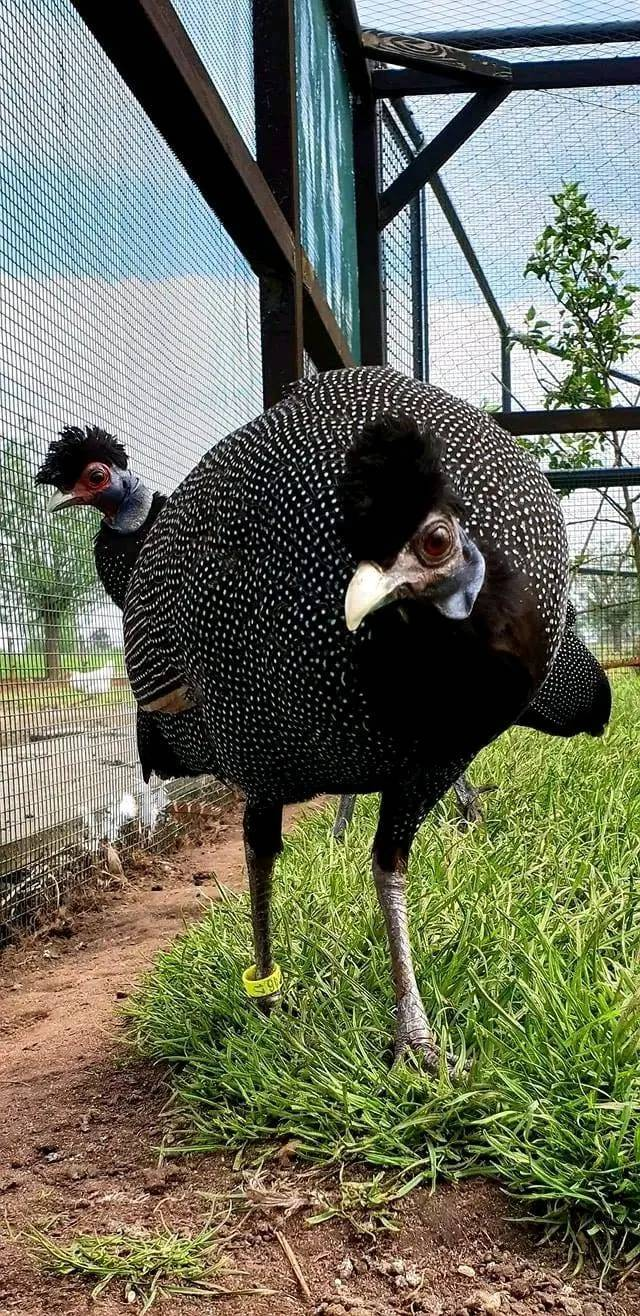 Also, make sure you provide water for them throughout the day. Keets might drown if given a large water source, so I started out by providing drinking water in a shallow “jelly jar” lid. As the keets grow, you can provide a regular chicken watering pan.
Also, make sure you provide water for them throughout the day. Keets might drown if given a large water source, so I started out by providing drinking water in a shallow “jelly jar” lid. As the keets grow, you can provide a regular chicken watering pan.
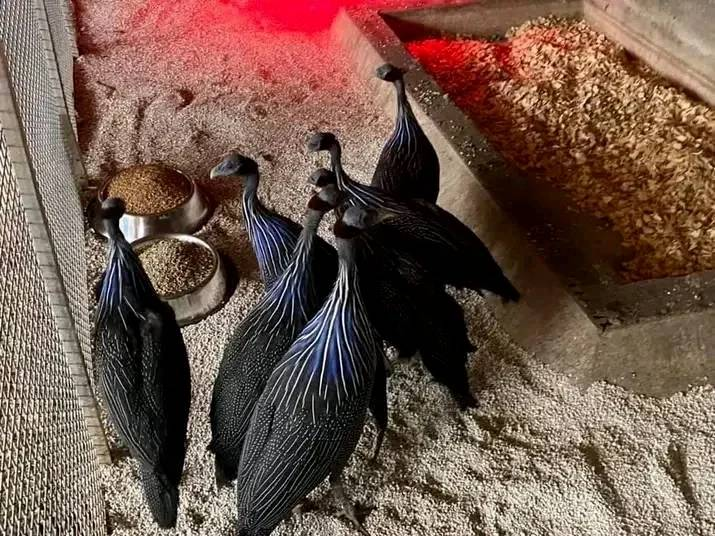 Adult Housing and Daily Care
Adult Housing and Daily Care
Some producers choose to leave their birds out in the evening. Unlike chickens, guineas will find a roost high in a tree and rarely suffer from predator attacks. (If you have owls in your region, they can get your guineas that are roosting in trees, so just to be safe, you should train your birds to sleep inside.)
Contact: (610) 614-6266
Email: mittyfarms@gmail.com
17 Hollow Rd Telford, Pennsylvania(PA), 18969
www.mittyfarms.com
Birds are priced per pair unless otherwise stated
Prices subject to change without prior noticed.
Vulturine guinea fowl _____$900pair
Crested guinea fowl ____$915pair
Fertile eggs ________$20 each
__________________________________________________________
 I maintain a flock of guineafowl for several reasons. They produce great eggs and alert me when I have visitors as quickly as any watchdog, but most importantly, they spend the day foraging for ticks. Here in the tropics, I have a lot of ticks, and if you live in an area with Lyme disease, Rocky Mountain Spotted Fever, or other tick diseases,guinea might be the best animal you have ever owned.
I maintain a flock of guineafowl for several reasons. They produce great eggs and alert me when I have visitors as quickly as any watchdog, but most importantly, they spend the day foraging for ticks. Here in the tropics, I have a lot of ticks, and if you live in an area with Lyme disease, Rocky Mountain Spotted Fever, or other tick diseases,guinea might be the best animal you have ever owned. Guinea fowls are well adapted to heat and sunlight, and they can do very well even without a lot of extra care. You will need to search for the best feed sources for your new guineas, adapt heating sources since the requirements are so different, and maybe even look into alternative incubation sources, but it is all worth it.
Guinea fowls are well adapted to heat and sunlight, and they can do very well even without a lot of extra care. You will need to search for the best feed sources for your new guineas, adapt heating sources since the requirements are so different, and maybe even look into alternative incubation sources, but it is all worth it.The birds are friendly and make excellent watchdogs. If kept alone, they like to sit with their human keeper, but in flocks, they will usually prefer their own types, like many animals. The birds spend their days eating ticks and other insects around the property, and during their foraging, they will eat enough to produce eggs and pay for any upkeep.
 Housing Your New Keets
Housing Your New KeetsRaising keets (hatchling guineas) is not as easy as raising chicks. Like with any new animal, it is important to prepare the housing before arrival. Get several birds (at least 6 but 10 is even better), and make sure they have room to grow for the next few weeks. In the tropics, you will not need to buy a heat lamp for them, but if they are to be raised without their mother, they might get chilled at night and need some source of supplemental heat.
A simple incandescent light bulb will provide enough warmth in the evenings. If you do not have reliable electricity or do not want to put a lamp in the outdoor cage, the alternative is to bring your keets in at night and keep them in a small cage.
I cannot guarantee the birds will not be chilled since some tropical regions can get cold at night. If you have a broody hen, you can put the keets with her, but she might end up stepping on and harming the keets.
 Bedding for Your New Keets
Bedding for Your New KeetsWire cage bottoms are easy to clean and will keep predators away from your keets, but they will cause you a lot of problems and may end up killing your new keets when they get their feet trapped. Your new guineafowl should also not be kept on sawdust because the keets will peck constantly and sometimes mistake the wood chips for food. Their small stomachs will soon fill up with wood, and they will die of hunger.
 Do not use newspaper, though, as it is too slick. Some guinea farmers recommend paper towels, and they are fine if available where you live.
Do not use newspaper, though, as it is too slick. Some guinea farmers recommend paper towels, and they are fine if available where you live.The best bedding I have found is cardboard. Normal cardboard is too slick, and the keets can slip and dislocate their legs; rip the cardboard in half so that the corrugated portion is visible. Put the slick side down and leave the corrugated portion on top.
In a few weeks, when the keets are larger, you can let them run on dirt. If you have a wire bottom cage, set it directly on the ground.
 Feeding and Watering Keets
Feeding and Watering KeetsIf you have turkey starter ration available where you are living, purchase that product and start your keets outright. Keets should not be fed chicken grower ration, but sometimes that is the only thing available. Chicken starter ration is only about 22% protein, most of that coming from soy protein. If that is the only feed available, you should supplement feed with a higher protein ration. I purchase a fish ration, which is 40% protein, most of that from fish viscera.
It may not sound tasty, but the keets like to find the little fish granules in their starter ration and will eat them with gusto. I usually add a few handfuls of fish granules for every 125 grams of chicken starter ration that I give at each feeding. (The chicken and turkey starter rations will already contain a coccidiostat. This medicine will help prevent coccidiosis and loose stools that will cause your keets to become dehydrated and die.)
 Also, make sure you provide water for them throughout the day. Keets might drown if given a large water source, so I started out by providing drinking water in a shallow “jelly jar” lid. As the keets grow, you can provide a regular chicken watering pan.
Also, make sure you provide water for them throughout the day. Keets might drown if given a large water source, so I started out by providing drinking water in a shallow “jelly jar” lid. As the keets grow, you can provide a regular chicken watering pan. Adult Housing and Daily Care
Adult Housing and Daily CareSome producers choose to leave their birds out in the evening. Unlike chickens, guineas will find a roost high in a tree and rarely suffer from predator attacks. (If you have owls in your region, they can get your guineas that are roosting in trees, so just to be safe, you should train your birds to sleep inside.)
Contact: (610) 614-6266
Email: mittyfarms@gmail.com
17 Hollow Rd Telford, Pennsylvania(PA), 18969
www.mittyfarms.com